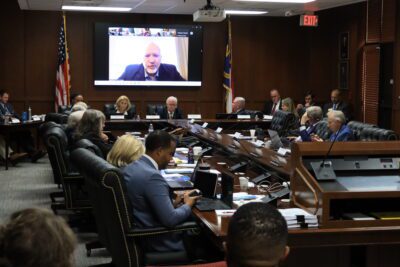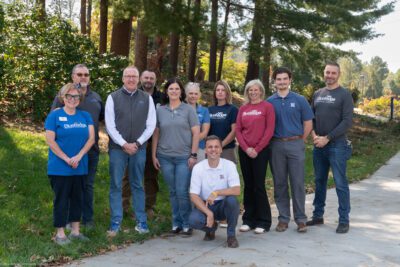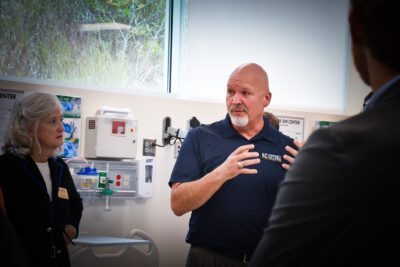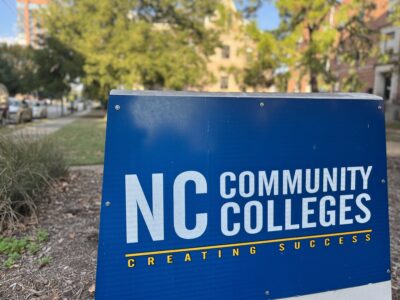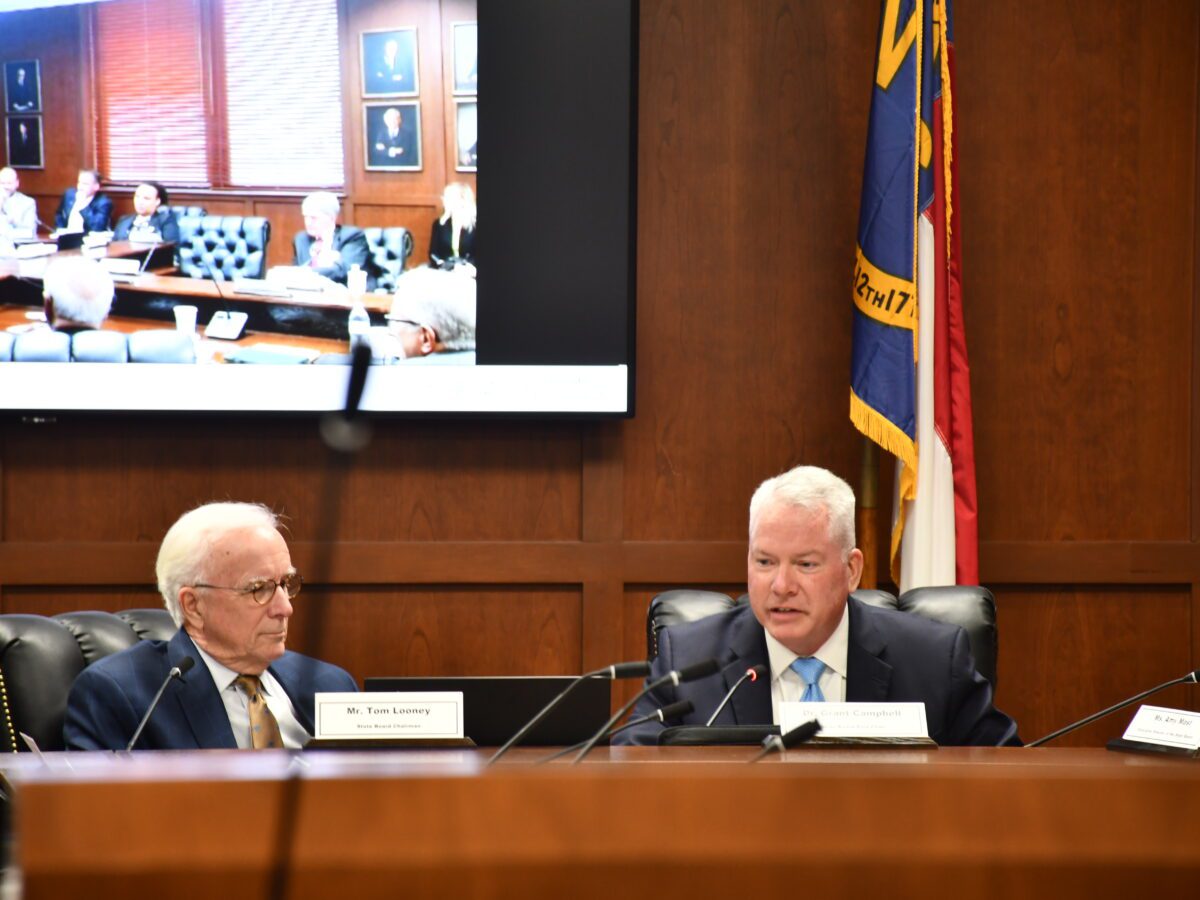
|
|
The State Board of Community Colleges voted on Friday, Nov. 15, to provide contingent approval of an allocation of $76 million in enrollment growth funds to colleges that experienced an enrollment increase during Fiscal Year (FY) 2023-24.
That allocation is contingent on the General Assembly voting to override the governor’s veto of the mini budget, which among other things, includes funds to expand private school vouchers and enrollment growth funds for public schools and community colleges. The General Assembly reconvenes on Tuesday, Nov. 19 and is expected to vote to override the veto.
“If we don’t do this, (and) if the funds get approved next week, then we’d have to wait until January to take action,” N.C. Community College System President (NCCCS) Dr. Jeff Cox told the Board on Friday. “The colleges are desperate for this funding, so… as soon as it’s approved, we want to get the money out the next day, so that’s the rationale.”
Fifty-two of the state’s 58 colleges experienced enrollment growth last fiscal year, according to a system document.
During the State Board of Community College’s August meeting, system staff said that without the funding, some colleges are facing large budget deficits for this fiscal year, which impacts planning for the spring semester.
“Many of them are millions of dollars short on the budget from where they would be,” Cox said at the time. “So they’re having to make some of those hard decisions right now.”
During the Board’s meeting, Johnston Community College Board Chair Lyn Austin highlighted concerns from the N.C. Association of Community College Trustees (NCACCT).
The NCACCT executive board said the delay in enrollment growth funding is stalling the momentum of growth across the system, and that receiving funding is an urgent issue.
In response, the executive board has asked local board chairs to work with presidents to contact legislators ahead of the Nov. 19-21 session. Their goal was to share specific information about how the delay in funding is impacting colleges.
Without the enrollment growth funding, for example, Johnston Community College said it “faces cutting classes and increasing class sizes, obviously. But those cuts will not be sufficient to balance our budget. We would need to reduce our workforce with midyear layoffs— we estimate 12 positions, spread across all functional areas.”
Per the NCCCS document, Johnston Community College is set to receive more than $3.2 million in enrollment growth funds.
“This has the potential to slam the brakes on JCC’s progress,” Austin said.
According to Alex Fagg, NCCCS vice president of government and external relations, not having the enrollment adjustment increase is “unchartered territory” for the system. While the adjustment is not statutorily required, Fagg said it has historically been included in the state’s two-year and adjustment budgets.
“I am hopeful as well that we will get an override in our enrollment growth for our colleges,” he said on Friday. “Other items that may come up is a potential round of hurricane relief, but I’m unsure on any other things at this time that might come out of the session.”
On Oct. 24, the General Assembly passed a second Hurricane Helene relief package, which included $16.75 million to the NCCCS for impacted community colleges in western North Carolina.
On Friday, the Board voted to approve an allocation of $16.7 million to the 14 impacted community colleges.
The Board also voted to establish a $50,000 system office fund “to support emergency scholarship grant applications submitted by eligible students enrolled at any other community college and who as of September 26, 2024, resided temporarily or permanently, in a county designed under a major disaster declaration by the President of the United States under the Stafford Act (P.L. 93-288) as a result of Hurricane Helene.”
Of the 14 colleges, six were considered the most impacted by Helene and received 80% of available funds: Asheville-Buncombe Technical, Blue Ridge, Haywood, Mayland, McDowell Technical, and Western Piedmont community colleges.
The other eight colleges, considered moderately impacted, received 20% of available funds.
Colleges have until June 30, 2025 to spend the funds.
Board celebrates new partnership with Google
On Thursday, the NCCCS announced a partnership with Google to offer tech and artificial intelligence (AI) training programs to all 58 community colleges statewide at no-cost to the colleges.
During Thursday’s Board meeting, the system hosted a signing event to celebrate the new programing, which includes the Google Career Certificates and the company’s AI Essentials and Prompting Essentials courses.
Through the partnership, the system will offer stand-alone certificates and for-credit courses for select Google Career Certificate fields.
“This partnership with Google underscores the North Carolina Community College System’s commitment to providing students with cutting-edge skills that align with the evolving needs of today’s workforce,” Cox said. “By offering these career certificates and AI training statewide, we’re ensuring that North Carolinians have access to high-demand tech credentials that can open doors to new career opportunities and help grow our state’s economy.”
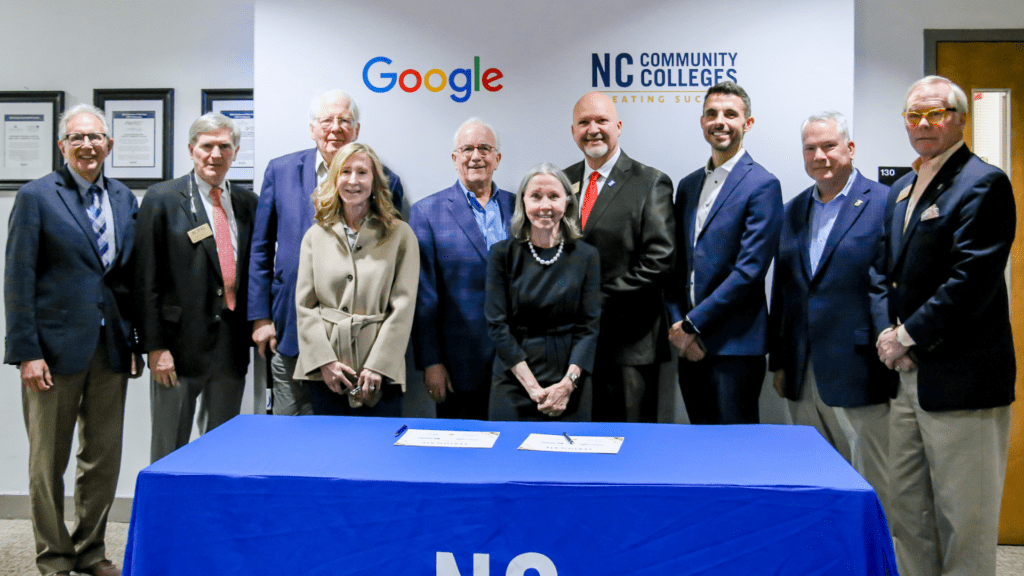
According to a system press release, the Google Career Certificates prepare students for in-demand fields like cybersecurity, data analytics, digital marketing and e-commerce, IT support, project management, and user experience design. Each certificate also includes practice AI skills specific to each field.
Completing a certificate will connect students to on-demand career resources and a network of over 150 companies in the Google Employer Consortium. In North Carolina, companies in that consortium include Google, Lowe’s, and Wells Fargo, the system said.
“Every student deserves the opportunity to enter the workforce with the skills needed to thrive,” said Lisa Gevelber, founder of Grow with Google. “We’re proud to work with the North Carolina Community College System to provide the Google Career Certificates program to every community college in the state. This will ensure that students and workers can access the certificates in their local communities and qualify for well-paying jobs in North Carolina.”
Since launching in 2018 on Coursera, more than 250,000 people have graduated from the program in the U.S. Seventy-five percent of graduates report a positive career impact within six months, such as a new job, higher pay, or a promotion. Fifty-five percent of graduates identify as Asian, Black, or Latino.
System press release
“The North Carolina Community College System continues to build upon strategic partnerships that provide students with credentials in high demand careers,” said NCCCS Senior Vice President and Chief Academic Officer Dr. Brian S. Merritt. “This partnership with Google is yet another great example of the high-caliber credentials being earned by community college students.”
Reports on high-cost workforce, health care programs
The Board also discussed several important reports during its November meeting.
The first report, on High-Cost Workforce Program Start-Up Funds, said that in January 2023 the Board approved an allocation of $5.2 million to 16 community colleges for this grant initiative.
Implementing the High-Cost Workforce Start-Up Fund Program encountered multiple challenges, such as delays in equipment procurement due to supply chain disruptions and difficulties recruiting qualified instructors for highly specialized fields. Despite these challenges, the initiative demonstrated that North Carolina’s community colleges respond effectively to the state’s workforce needs with targeted funding and strategic partnerships with industry stakeholders.
Excerpt from report
According to the report, all 16 grantees launched new programs, resulting in 865 enrollments, 734 completers, and students earning more than 450 industry-recognized credentials.
Most of the funding (65%) went toward equipment purchases. Funding also supported 29 faculty positions, per the report.
The system found the employer engagement was critical to the success of the program. Sustaining new programs after grant funding ends will depend largely on strong industry partnerships, the report says, and maintaining a responsive curriculum and steady student enrollment.
“The System Office staff is proud of the overall outcomes of this grant program,” the report says. “By focusing on meeting the needs of local and regional labor demands, the colleges are well-positioned to sustain these programs, attract new students, and meet the evolving demands of North Carolina’s workforce.”
Here’s a look at the data from the 16 programs:
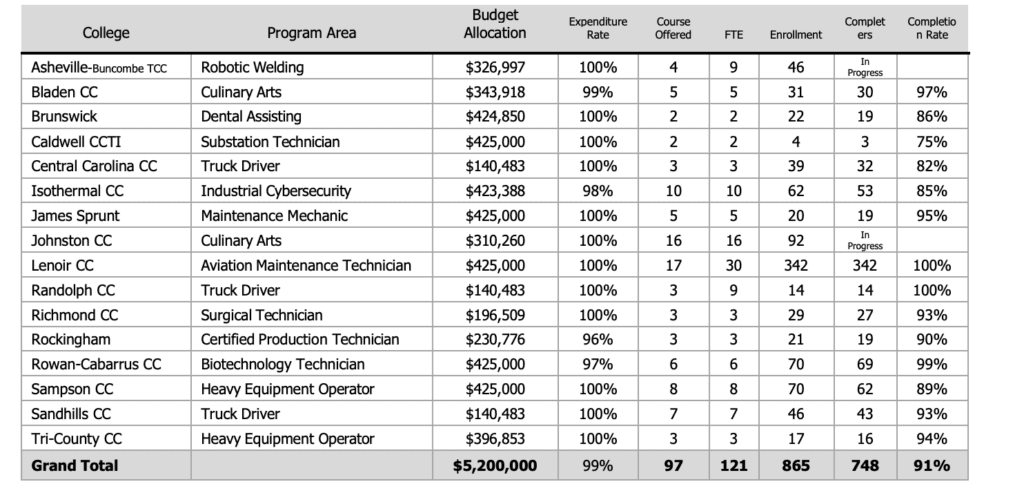
The Board also discussed a system report on the High-Cost Healthcare Start-Up and Expansion Grant, covering FY 2023-24.
In 2023, the General Assembly appropriated $55 million in non-recurring funds to assist community colleges in starting or expanding existing programs in high-demand health care occupations, with the goal of strengthening the state’s health care workforce pipeline.
To date, per the report, all 58 community colleges received funding, totaling over $48.7 million across start-up and expansion initiatives. Most funds targeted high-need areas like nursing, EMS, dental assisting, and medical sonography.
The allocation of these funds had a significant impact on 21 Tier 1 rural counties, directing nearly 44% of resources toward economically distressed areas. This strategic distribution addresses workforce shortages in rural settings and enhances healthcare access in underserved communities.
Excerpt from report
According to the report, the funding will help address North Carolina’s health care workforce needs by fulfilling workforce gaps, supporting rural health care access, and ensuring sustainability beyond initial funding.
You can read the full report here.
On Friday, as part of its consent agenda, the Board also approved an allocation of $3.5 million in High-Cost Workforce Start-Up Funds for FY 2024-25, to continue supporting the start-up of health care workforce programs offered at community colleges across the state.
The Board also briefly discussed two other reports:
- NC Child Care Grant Program for Community College Students. In the 2023-24 fiscal year, the General Assembly allocated approximately $3 million to support child care services for student-parents enrolled in community colleges. The grants were awarded to 742 students across the state, with an average award amount of $3,263.18. Only 17 community colleges fully expended their allocated funds for the fiscal year.
- Summary of 2023-24 State Funded Financial Aid Programs for Community College Students. During the 2023-24 fiscal year, 28,593 students received a total of approximately $24.3 million in North Carolina Community College Grants. This represents an increase of nearly 10,000 students and $9.4 million from what was disbursed to students during the previous year.

New Board members, new multi-campus center, and more
- Following the election, there are three expiring terms on the Board, including State Treasurer Dale Folwell, Lt. Gov. Mark Robinson, and Dr. Grant Campbell. Folwell and Robinson did not run for reelection in their roles, meaning that Treasurer-elect Brad Briner and Lt. Gov-elect Rachel Hunt will join the Board in January. Campbell was elected to the state House, meaning that his seat must be refilled. His last meeting was on Friday.
- The Board voted to provide Alamance Community College (ACC) with preliminary approval to designate the Dillingham Center as a multi-campus center (MCC). By granting preliminary approval, the State Board agreed to include the MCC funding (approximately $637,951) in its budget request for FY 2025-26.
- Pamlico Community College Interim President Michelle Willis Krauss unexpectedly died earlier this month. On Friday, the Board voted to retroactively approve the college’s acting president. The college hopes to seek final approval for a new president in January.
- The Board approved the 2024-25 system president’s performance plan and compensation document, which lays out a plan for how to award Cox’s bonus for the fiscal year. The bonus, which is based on progress made on the system’s five strategic goals, is up to $50,000 and will be voted on at the end of the fiscal year.
- Finally, the Board reviewed a number of audit reports:
The next State Board meeting is scheduled for Jan. 16-17, 2025.



